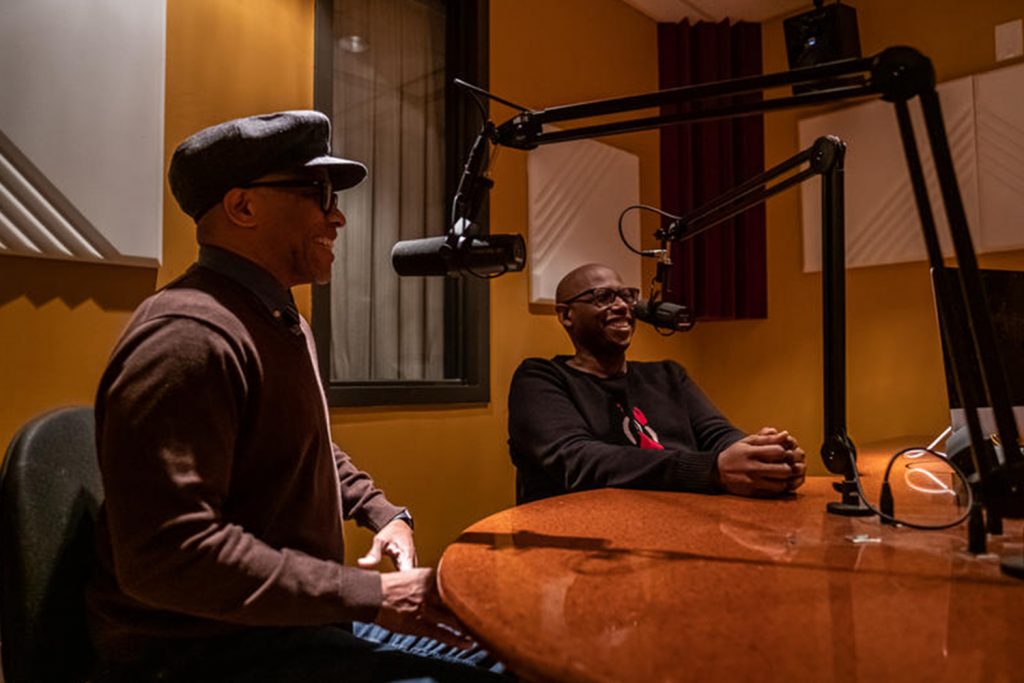
Jeff Wray and Julian Chambliss, two distinguished professors from Michigan State University’s Department of English, joined Russ White on WKAR’s MSU Today to talk about their work and how it impacts their students and our evolving society.
The conversation began with their thoughts on a challenging time for racial tension on campus.
“It has been a challenging year, but in some ways, it’s been a typical year in that these things continually happen, and it’s not just at MSU,” Wray said. “I have to address it in class because my students are concerned about it and I’m concerned about it as well. But when my students are raising it on the tail of these various incidents, oftentimes what we’re going to do in class that day goes out the window. The classroom is one of the best places to discuss these issues with students because you build personal relationships with them.”

(Photo by Daniel Trego)
Chambliss added that some of the content of the courses he’s teaching right now intersects with these questions.
“Sometimes we’re talking about them directly. Sometimes we are talking about them indirectly,” Chambliss said. “It’s a way for them to process. I’m always mindful of the fact that from the students of color perspective, this isn’t necessarily a shock. It’s not necessarily like, ‘Oh, I can’t imagine how this happened.’ They can totally imagine how it happened. Having the discussions is a reflection of growth. Students of all colors see this as wrong.
“The struggle for the institution is to think through how are they going to respond to the real concerns that students of color have and make a culture where students of color don’t have to worry about constantly being on guard around these thoughtless, insensitive, hurtful actions. It’s really interesting for us as educators to be trying to create a space where these conversations can happen and people of all colors feel OK about talking about this. I often say this in class: ‘We’re all here to learn and we’re trying to build the capacity to be better people, right? To have the kind of society that we say we want.’”
Wray and Chambliss have creative approaches to teaching and telling stories of Black American history.
“Every month is Black History Month to me,” Chambliss said. “There’s this sort of branding problem in my mind when it comes to the celebration of Black history.”

(Photo by Daniel Trego)
“Like Julian, I’m a bit conflicted about it because every month is Black History Month and Black history is American history,” Wray said. “Despite the branding issues, Black History Month provides an opportunity to highlight some things and do a little bit of myth-busting. I hope it will continue to evolve; that’s what some of us are constantly doing. We’re trying to force it in some ways to evolve into this other broader year-long discussion.
“The great thing about teaching in the film realm is those times when I see that light bulb go off for a student I’ve often had in class for four years. And that, just in terms of teaching, feels great. It feels like I got one today,” he said with a smile.
The classroom is one of the best places to discuss these issues with students because you build personal relationships with them.
PROFESSOR JULIAN CHAMBLISS
Both scholars tell how they use Birth of a Nation, which they both describe as perhaps the most racist movie of all time, in their classes. And for those who only consider books and writing papers as a way to teach and learn, particularly in traditional English classes, Wray and Chambliss share their views on how hip hop culture, music, film, and comics are equally and probably increasingly important.
“I can give a plug to our English Department where I often say we are not your parents’ English Department,” Wray said. “Our current world is books and films and comics and hip hop. And we have to in some ways respond to what is. We can’t be cultural Luddites in that way. Hip hop is here, hip hop has been here, hip hop is critical to social, cultural, racial, gender dynamics, and film. We just cannot afford to ignore that as part of our educational mission.”
Listen to the full conversation with Jeff Wray and Julian Chambliss.
(Originally posted on WKAR)
(Top photo by Daniel Trego)


